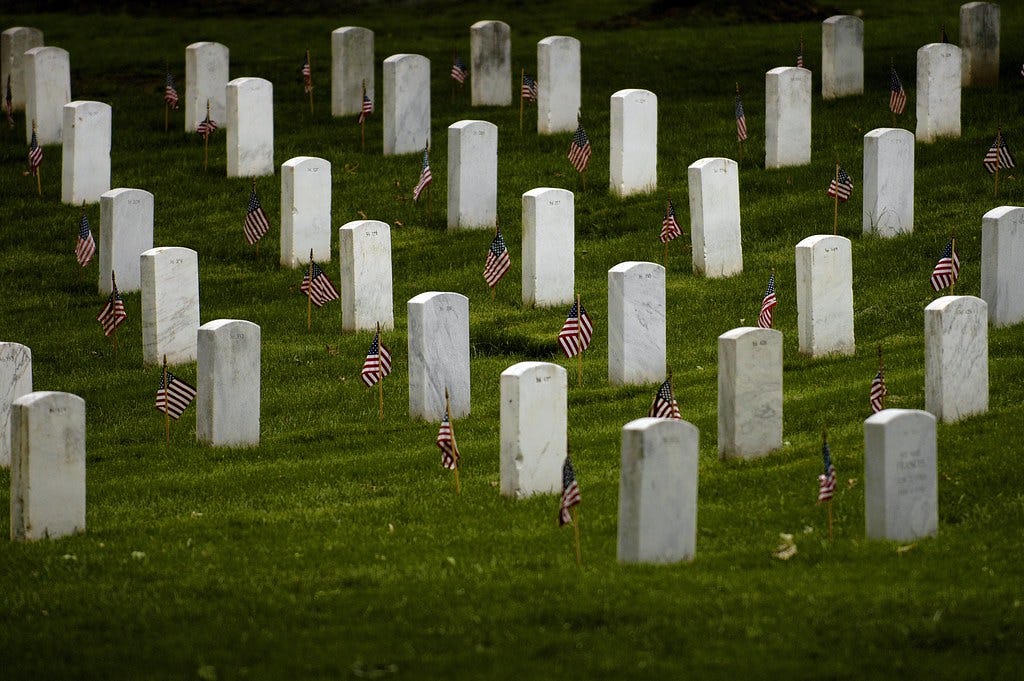The Rise, Fall, and Resurrection of Sacrifice as a Core American Value
There are nascent signs—particularly in the wake of the pandemic—that the country is pivoting back toward a shared understanding of the need for individual sacrifice for the greater good.
I'm a proud Oregonian, the lucky spouse of @AdamsKalloch & father of two. Former: ACLU lawyer/Policy wonk. Current: Global Public Policy, Airbnb.

TL:DR: There are nascent signs—particularly in the wake of the pandemic—that the country is pivoting back toward a shared understanding of the need for individual sacrifice for the greater good. However, leaders are lagging behind, failing to use the language of sacrifice to rally people across racial, geographic, and political lines, and and failing to step back from their own ideological/party purity. This cowardice—the antithesis of leadership—could have serious implications for our ability to solve collective challenges ahead.
The Rise, Fall, and Resurrection of Sacrifice as a Core American Value
“Ask not what your country can do for you, ask what you can do for your country.” President John F. Kennedy’s demand sounds like a bold challenge today, in an era when politicians are more likely to ask us to shop till we drop than to sacrifice for the next generation, even in the midst of a crisis.
But the truth is that sacrifice was a consensus value—and indeed, expectation—across the political spectrum during much of American history. As then-Vice President Richard Nixon stated when he accepted the GOP nomination in 1960, Americans must “sacrifice—not the grim sacrifice of desperation, but the rewarding sacrifice...which comes from working together in a cause greater than ourselves, greater than our Nation, as great as the whole world, itself.”
In the latter part of the 20th century, however, sacrifice retreated as a salient core value in American life. Using Google Books Ngram Viewer, which displays how often words or phrases have occurred in a corpus of books compiled by the search engine, you can see how the very mentioning of the term “sacrifice” (in English) plunged by more than 75 percent from its peak in the 1820s to its trough in the mid 1980s, notwithstanding short bursts in usage (1918, 1941) before quickly returning to the gradual decline.
According to Oregon State Associate Professor Christopher McKnight Nichols, “The United States [] lost the language and practice of collective sacrifice for the common good,” in the late 20th century.
However, as the chart indicates, the early years of the 21st century has witnessed a small, but significant resurrection of sacrifice as a salient concept in the lives of Americans. Further evidence of this shift comes from a 2019 survey commissioned by Hill-HarrisX, which found that 68 percent of registered voters said the country should make “some” or “big” economic sacrifices to improve environmental conditions, with younger voters (18-34) even more inclined to say “big” sacrifices were necessary.

More encouraging still, the sentiment of sacrifice crossed party lines and geographic differences. A majority (56 percent) of Republican voters said Americans should make a lot or some economic sacrifices, with 63 percent of independents and 82 percent of Democrats in agreement. Meanwhile, 68 percent of rural voters supported a lot or some economic sacrifices, with suburban (66 percent) and urban (72 percent) voters reporting similar sentiment.
This turn back toward sacrifice as a core value has accelerated during the pandemic, according to new research published in a special pandemic issue of the journal Human Behavior and Emerging Technologies. In the study, researchers from Harvard and UCLA used Google
Search data and social media posts to gauge psychological and cultural shifts in the COVID-19 era. The results were striking.
“‘Sacrifice’ was a complete nonstarter in U.S. culture before COVID," said study author Patricia Greenfield, a professor of psychology at UCLA. However, after the onset of the pandemic, Google searches significantly increased for many words associated with collectivism, from “sacrifice” and “share” to “help” and “give.”
Unfortunately, too few leaders—in Oregon and across the country—appear willing to call this commitment to question by asking their constituents to sacrifice for the greater good. Instead, we are told that there are no losers when it comes to free trade deals; that we can expect “unprecedented levels of prosperity” from major climate legislation (as opposed to near term sacrifice for long term benefit); that we “no longer have to worry about budget deficits.”
Moreover, many of those same leaders appear unwilling to give any ground on their own ideological/party purity (research shows that party vote unity in Congress has soared in recent years) or to set aside their own ego to contemplate the possibility that their own opinion may not be the right one. In this way, a return to sacrifice not only involves asking more of the public, but also demanding more of our elected officials.
Perhaps it should be no surprise then that while Americans say they believe the country should make sacrifices, when they are confronted with making individual sacrifices, support evaporates. A 2019 survey by Kaiser Family Foundation/Washington Post found that most Americans from both parties are unwilling to make personal sacrifices such as paying higher taxes at the gas pump or on their electric bills.
As we emerge from the COVID crisis, we have a unique opportunity to reshape American politics around an ethos of sacrifice. It is a value deeply rooted in the American Experience and the Oregon Way—from the farm workers of the Willamette Valley and the home health aides of Portland to the bait and tackle owner on the Oregon Coast and the high desert ranchers of Harney County.
Each of us is ready, able, and willing to give part of ourselves for our families, communities, nation, and world. Our leaders need to be courageous enough to ask and then to provide meaningful opportunities for us to follow through on sacrificing for others, as well as the next generation.
***************************************
Connect with Andrew:
@AndrewKalloch




